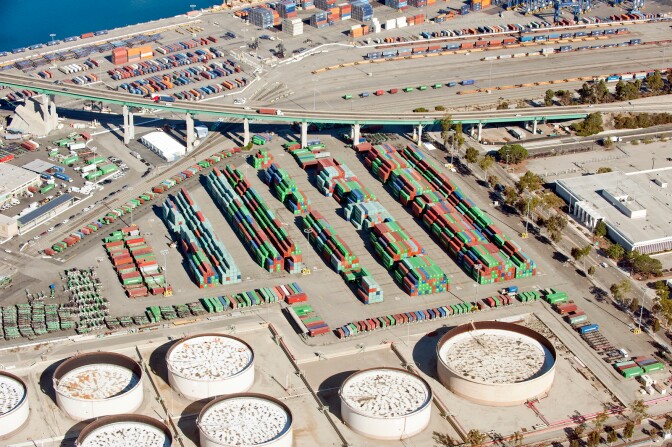This story is free to read because readers choose to support LAist. If you find value in independent local reporting, make a donation to power our newsroom today.
This archival content was originally written for and published on KPCC.org. Keep in mind that links and images may no longer work — and references may be outdated.
Here's how port labor strife could translate to higher gas prices

Southern California fuel prices could jump sharply if local refiners cut back on gasoline production because they can't get rid of growing stockpiles of a byproduct known as petroleum coke.
The problem is a ripple effect of tense contract talks between the International Longshore Workers Union, which represents some 20,000 dock workers at the ports of Los Angeles and Long Beach and the Pacific Maritime Association, which hires them.
Crude oil -- one of the biggest imports into L.A. and Long Beach -- is flowing from tankers into refiners' terminals just fine. It's what comes out the other end of the refinery that's getting jammed up in the port dispute.
Petroleum coke is a black grimy substance that resembles charcoal briquettes. It is left over from the process of refining crude oil into gasoline or other petroleum products. It is transported, transferred between vehicles, and stored in covered containers, so that its dust does not become an airborne pollutant.
The Pacific Maritime Association withdrew nightshift workers in mid-January from Oxbow Energy Solutions, a company at the port of Long Beach that ships petroleum coke to Asia, where it is burned as fuel.
Short of workers to load the coke onto vessels, Oxbow has been stockpiling the coke in its covered storage barns, but it is running out of space. Refiners have some storage capacity, but they, too, are nearly out of space.
Gordon Schremp, with the California Energy Commission, said refiners are asking the Pacific Maritime Association to send the night workers back to Oxbow.
"If they can't do that, refineries will have to curtail operations and eventually shut down their process units, which will significantly reduce fuel supplies for Southern California," Schremp said.
"The Energy Commission is closely monitoring developments to determine the point when refinery operations could be negatively impacted," Schremp said.
The Western States Petroleum Association last week asked Gov. Jerry Brown to declare a state of emergency at the port and to intervene to return the night workers to Oxbow. Brown has urged labor and management to quickly resolve the problems, but he has not publicly taken other action, spokesman Evan Westrup said.
Representatives of the Pacific Maritime Association did not return calls. Oxbow Energy Solutions also did not respond to a request for comment.








